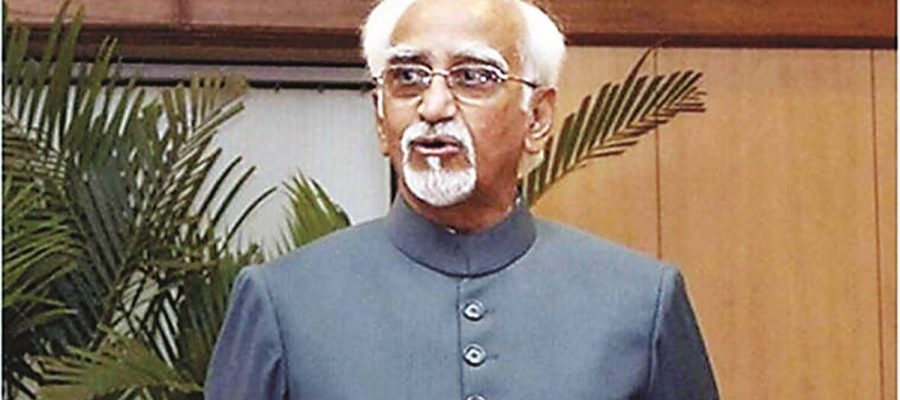Former Vice President Hamid Ansari says that for many decades after Independence, a “pluralist view of nationalism and Indianness” characterized India’s thinking, but recently has been supplanted by one that “threatens to rule out dissent”.
Former Vice President Hamid Ansari has said in his new autobiography that “authoritarianism, nationalism and majoritarianism” played a role in the 2019 election and that a “subversion of core values is now underway”.
The book, By Many a Happy Accident, is on Ansari’s life as a diplomat, AMU V-C and then Vice President and Rajya Sabha Chairman for two terms. It also contains several accounts of Ansari’s interactions with Prime Minister Narendra Modi, one of them being when he had just become Vice President and was called on by Modi, then Gujarat Chief Minister. “I referred to the post-Godhra happenings in his state in 2002 and asked why he allowed it to happen. He said that people look at only one aspect of the matter and pay no attention to the good work he has initiated, particularly for the education of Muslim girls. I sought its details and suggested that he should publicize it; ‘that does not suit me politically’ was the revealingly candid response”, the book says.
Ansari also says that for many decades after Independence, a “pluralist view of nationalism and Indianness” characterized India’s thinking, but recently has been supplanted by one that “threatens to rule out dissent”.
“More recently, a version of nationalism that places cultural commitments at its core and promotes intolerance and arrogant patriotism has tended to intrude into and take over the political and cultural landscape. One manifestation of it is ‘an increasingly fragile national ego’ that threatens to rule out any dissent however innocent. Hyper-nationalism and the closing of the mind is also ‘a manifestation of insecurity about one’s place in the world,” he says.
Ansari writes in the book: “The success of populism (rightly depicted not as an ideology but rather a strategy to obtain and retain power, and thriving on conspiracy, criminalization of all opposition, playing up external threats) proved itself in the 2019 general election. It was assisted by authoritarianism, nationalism and majoritarianism. This ideological potion, premised simplistically on the desirability of oneness of language, ethnicity, religion, territory and culture was administered successfully to a little over a third of the electorate…It is evident that a subversion of core values is now underway, an exercise that touches every citizen and leaves none untouched. Its impact is compounded by the abdication or failure of other social and political forces to comprehend its true nature and the urgency to counter it.”
The book also touches on the Centre’s steps in the erstwhile state of Jammu and Kashmir. “The sleight-of-hand tactics adopted do little credit to the regime of Rule of Law and the principles of democracy professed by the Republic. They amount to what has been called ‘a show of brute majoritarianism,” it says.
Ansari also writes that as far back as in “2014-15”, a demand was raised “by the government floor managers that a bill may be allowed to be passed in the din in the Rajya Sabha”.
“It was pointed out to them that while there were instances in the past when bills were indeed passed in the din, that happened with a necessary precondition that the government had a majority in the House. With a paper majority, the bills at times were cleared with voice vote, provided no one asked for the division of votes. However, in the current case, the ruling NDA did not have the majority. So, it was technically, procedurally and morally impossible to pass the bills in din, assuming the majority for the government,” Ansari writes. He added that during the UPA period he had taken a position that no bills will be passed in the din. “This was appreciated by the principal Opposition leaders.”
Ansari says while the position did “bring discomfiture” to both governments, the “UPA took cognizance of my principled stand and compensated it by floor management and adjustments with the Opposition”. “The NDA, on the other hand, felt that its majority in the Lok Sabha gave it the ‘moral’ right to prevail over procedural impediments in the Rajya Sabha. An expression of this was conveyed to me authoritatively, and somewhat unusually, when one day PM Modi walked into my Rajya Sabha office unscheduled. After I got over my surprise, I made the customary gestures of hospitality. He said that ‘there are expectations of higher responsibilities for you but you are not helping me’. I said that my work in the Rajya Sabha, and outside, is public knowledge. ‘Why are bills not being passed in the din?’ he asked. I replied that the Leader of the House and his colleagues, when in Opposition, had appreciated the ruling that no bills will be passed in the din and that normal procedures of obtaining consent will be observed. He then said that the Rajya Sabha TV was not favourable to the government. My response was that while I had a role in the establishment of the channel, I had no control over the editorial content and that a committee of Rajya Sabha members, in which the BJP was represented, provided broad guidance to the channel, adding that from all accounts, the channel’s programmes and discussions were appreciated by the viewers,” the book says.
Source: Read Full Article


